|
|
|
Sort Order |
|
|
|
Items / Page
|
|
|
|
|
|
|
| Srl | Item |
| 1 |
ID:
149547
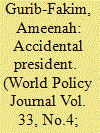

|
|
|
|
|
| Summary/Abstract |
World Policy Journal speaks with Dr. Ameenah Gurib-Fakim, a biochemist who became the first female president of Mauritius. She discusses the importance of integrating science into politics, what prevents women from rising into positions of power, and how her country pulled off its “economic miracle.”
|
|
|
|
|
|
|
|
|
|
|
|
|
|
|
|
| 2 |
ID:
106032
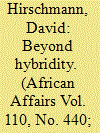

|
|
|
|
|
| Publication |
2011.
|
| Summary/Abstract |
This article investigates the cultural dynamics and tensions of efforts to reform African tax bureaucracies according to contemporary global standards of independence, transparency, and efficiency. Focusing on the controversial establishment of a semi-independent tax authority in Mauritius, the article perceives tax reform as an uneasy and unstable meeting of different organizational cultures and epistemic communities. Unlike much existing literature - which understands public sector reform within the dichotomy of the modern and the traditional, and a resulting hybridity of bureaucratic culture - the article suggests that the notion of 'tribidity' better describes the reformed Mauritian tax authority. Here, three bureaucratic cultures interact: a global semi-private sector, centred on the performance-based culture of New Public Administration (NPA); a communal culture, emphasizing loyalty, ethnic identity, and union solidarity; and a Weberian culture, where process, hierarchy, and security are fundamental. The unsettled interplay of these overlapping bureaucratic cultures determined the fate of Mauritius's tax reforms, showing how such reform cannot be approached as entirely technical and apolitical.
|
|
|
|
|
|
|
|
|
|
|
|
|
|
|
|
| 3 |
ID:
068918
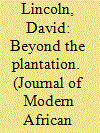

|
|
|
| 4 |
ID:
155373
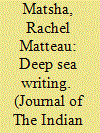

|
|
|
|
|
| Summary/Abstract |
Oceans have occupied our imagination since time immemorial, both in symbolic and in practical ways. The Indian Ocean is a region characterized both by complex economic, historical, cultural, and social entanglements. Memories of recent and distant pasts plumb oceanic depths, needing to be carefully recollected and sieved to make sense of the present, and imagine possibilities for the future. The ocean is thus read as a site of contested struggles, a space where historical identities and stories interconnect. Storytelling is one device through which personal and collective memories can resurface and be questioned, as can be observed in the work of South African-born Mauritian writer and activist Lindsey Collen. This essay discusses Collen’s outlook on the Indian Ocean region, and on Mauritian literature and socio-political landscape. Building on previous work and research on Collen as a major activist and literary figure in Mauritius, this paper is based on a series of interviews and conversations with Collen and the two authors.
|
|
|
|
|
|
|
|
|
|
|
|
|
|
|
|
| 5 |
ID:
164428
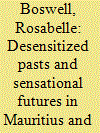

|
|
|
|
|
| Summary/Abstract |
This paper seeks to assert the relevance of ‘sensing’ identity in social analyses of the Southwest Indian Ocean islands. It is proposed that for some time, a broad concept of social change (specifically creolization) has been the reference point for understanding identity in the region. However, authors have tended to ignore the sensorial nature of human identity and the sensory experience of slavery and colonization. As a result, they have advanced a ‘sense’ less articulation of the islands and their inhabitants. Focusing on the senses in human identity and social experience, this article offers a sense-rich analysis of identity in the Southwest Indian Ocean region, revealing multidimensional senses of self in a diversity of social spaces. The author concludes that by fixating on historical dates, broad social processes and the interests of a largely patriarchal society, some scholars have desensitized the past, obfuscating the realities of and creativity emerging out of slavery and colonization. Sensorial analyses of identity in the Southwest Indian Ocean region open up new avenues for thinking about human/nature relations and politics, the nature of ‘culture’ and experiences of social change.
|
|
|
|
|
|
|
|
|
|
|
|
|
|
|
|
| 6 |
ID:
170226


|
|
|
|
|
| Summary/Abstract |
This article presents a case study of corporate social responsibility (CSR) in coastal areas of Mauritius where company CSR work has brought new ways of engaging with communities. The study examines in what ways companies are involved in ecosocial work and what the challenges and possibilities are from an environmental justice perspective. Based on interviews with representatives of companies and other organizations involved with CSR the study shows that CSR involvement in ecosocial work may bring possibilities for advancing environmental justice for local communities as it can enhance resources and capacity building, as well as bring actors together and play a role in advocacy and empowerment work. Challenges include that companies may have difficulties in contributing to greater justice in terms of community involvement. Moreover, inequalities and substantial environmental justice issues, such as access to land and safe housing, are difficult to fully address through a CSR framework.
|
|
|
|
|
|
|
|
|
|
|
|
|
|
|
|
| 7 |
ID:
173818


|
|
|
|
|
| Summary/Abstract |
This article presents a case study of corporate social responsibility (CSR) in coastal areas of Mauritius where company CSR work has brought new ways of engaging with communities. The study examines in what ways companies are involved in ecosocial work and what the challenges and possibilities are from an environmental justice perspective. Based on interviews with representatives of companies and other organizations involved with CSR the study shows that CSR involvement in ecosocial work may bring possibilities for advancing environmental justice for local communities as it can enhance resources and capacity building, as well as bring actors together and play a role in advocacy and empowerment work. Challenges include that companies may have difficulties in contributing to greater justice in terms of community involvement. Moreover, inequalities and substantial environmental justice issues, such as access to land and safe housing, are difficult to fully address through a CSR framework.
|
|
|
|
|
|
|
|
|
|
|
|
|
|
|
|
| 8 |
ID:
149832
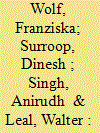

|
|
|
|
|
| Summary/Abstract |
Small Islands Developing States (SIDS) are isolated and surrounded by ocean. The generation and use of energy resources are two very important aspects for the development of SIDS. Unfortunately, most of SIDS do not use their potential in respect of energy resources, and they as a result have to depend on the import of fossil fuels in order to meet their energy needs. This increases the overall vulnerability of SIDS as they have to depend on the rising or fluctuating fossil fuels prices. Some SIDS, especially in the geographically dispersed Pacific region, do not have proper access to energy whereas other SIDS struggle more with energy security issue. At the same time, SIDS are most vulnerable to the impacts and effects of climate change, as they are among the ones to be most severely affected in case of natural calamities and sea-level rise.
|
|
|
|
|
|
|
|
|
|
|
|
|
|
|
|
| 9 |
ID:
188396
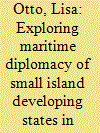

|
|
|
|
|
| Summary/Abstract |
Maritime diplomacy remains a poorly defined concept despite the fact that the maritime domain carries implications for the ways in which states relate to one another both in the past and in the contemporary era. Nonetheless, for many states, the maritime domain has come to hold increasing importance as it intersects with present environmental, economic, and security concerns. This is particularly true in Africa, where many states see the Blue Economy as their next economic frontier, presenting manifold opportunities for growth, but which are in turn threatened by transnational criminal activity, and, the universal challenge of climate change and environmental degradation. This article details the concept of maritime diplomacy and attempts to provide a typology for a deeper understanding of this form of diplomacy. It then considers the practical application of maritime diplomacy by the small island developing states in Africa, providing Mauritius and the Seychelles case studies.
|
|
|
|
|
|
|
|
|
|
|
|
|
|
|
|
| 10 |
ID:
108917
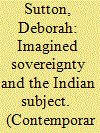

|
|
|
|
|
| Publication |
2011.
|
| Summary/Abstract |
This article considers the jurisdiction assumed by the Indian state over populations of Indian origin in British territories after 1947. In an intense and often excessive treatment of the Indian subject as citizen, appropriate conduct was promoted, approved political organisations were patronised and behaviour regarded as delinquent was castigated. Using examples from Mauritius, East Africa, the West Indies and South-East Asia, this article examines this short-lived project as a means of interrogating the post-colonial Indian state and more general questions of post-colonial identity, jurisdiction and sovereignty. The terms of the directives sent by the Ministry of External Affairs were derived from domestic agendas and anxieties. A singular Indian identity, free from regional linguistic or religious difference, was promoted. Inevitably, however, this Indian identity was articulated negatively, through the identification of those considered to be communal, separatist and therefore ''non-Indian'. However, local populations in these territories were by no means passive recipients of the diplomats' attention. In attempting to direct political action, the emissaries of the Indian state found themselves drawn into local political cultures over which they could not hope to exercise control.
|
|
|
|
|
|
|
|
|
|
|
|
|
|
|
|
| 11 |
ID:
155752
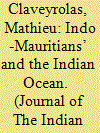

|
|
|
|
|
| Summary/Abstract |
Starting from a broad historical overview, and focusing on the main group in the Mauritian population (the Hindu descendants of indentured laborers), this paper goes through the many and changing narratives of indenture, as a ‘domesticating paradigm’ promoted in both literature and identity discourses. It deals with three connected questions, each helping us understand the relations between Mauritius and the Indian Ocean. First, is the issue of the links between so-called Indo-Mauritians and India, the territories their ancestors came from: have they been severed or enhanced? Second, comes the auto-representations and status of Mauritius: is it an ideal center-of-the-world, or a relegated island lost in the Indian Ocean? Third are the representations Indo-Mauritians have of their original migrations, through the crossing of the Indian Ocean. A final point notes the poor inclusion of Mauritius in the Indian Ocean compared with the powerful and exclusive link between India and Mauritius.
|
|
|
|
|
|
|
|
|
|
|
|
|
|
|
|
| 12 |
ID:
062723
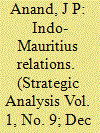

|
|
|
| 13 |
ID:
140783
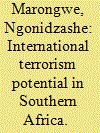

|
|
|
|
|
| Summary/Abstract |
This article discusses the potential factors for the development of international terrorism in southern Africa. While the region has seemingly been spared the terror attacks that have ravaged most other parts of the continent, and the globe at large, it is not immune to these attacks. Using a survey of the Southern African Development Community (SADC) countries, particularly the Democratic Republic of the Congo, Mozambique, South Africa, Mauritius, Zimbabwe, and Tanzania, which illuminate some of the permissive factors, the article asks, largely, first, to what extent is southern Africa at risk of global terrorism? And, second, in what ways can southern African states reduce the risk of terrorism in the region? Broadly, the article contends that, like most developing countries, including those from other parts of Africa, there exist permissive, both root and trigger, factors including insecure borders, democratization challenges, poverty, urban centers and variegated forms of both sub-state and state terrorism, that could provide useful platforms for the growth of international terrorism.
|
|
|
|
|
|
|
|
|
|
|
|
|
|
|
|
| 14 |
ID:
121981
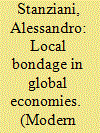

|
|
|
|
|
| Publication |
2013.
|
| Summary/Abstract |
This paper compares the definitions, practices, and legal constraints on labour in Britain, France, Mauritius, and Reunion Island in the eighteenth and nineteenth centuries. It argues that the way in which indentured labour was defined and practised in the colonies was linked to the definition and practice of wage labour in Europe and that their development was interconnected. The types of bondage that existed in the colonies were extreme forms of the notion, practices, and rules of labour in Europe. It would have been impossible to develop the indenture contract in the British and French empires if wage earners in Britain and France had not been servants. The conceptions and practices of labour in Europe and its main colonies influenced each other and were part of a global dynamic.
|
|
|
|
|
|
|
|
|
|
|
|
|
|
|
|
| 15 |
ID:
152206
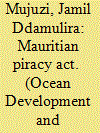

|
|
|
|
|
| Summary/Abstract |
In 2011 Mauritius adopted the Piracy and Maritime Violence Act (the Act). The Act does not expressly state that Mauritian Courts have jurisdiction over offenses committed outside of Mauritius. In Director of Public Prosecutions v Ali Abeoulkader Mohamed & Ors, the Mauritian Supreme Court dealt with the issue of whether the Act applied to non-Mauritius citizens where the alleged piracy acts had been committed outside of Mauritius on the high seas. This article assesses the Supreme Court's decision and suggest ways that the Act can be strengthened.
|
|
|
|
|
|
|
|
|
|
|
|
|
|
|
|
| 16 |
ID:
177592
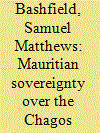

|
|
|
|
|
| Summary/Abstract |
This article examines the implications for the U.S. military base in Diego Garcia, located in the Chagos Archipelago, in the event that sovereignty of the atoll is ceded from the U.K. to Mauritius. Diego Garcia has become a critically important military base, facilitating U.S. power projection into the Indian Ocean, Middle East and Africa. The legality and future of British sovereignty over the atoll was challenged in 2019 in both the International Court of Justice and United Nations General Assembly. This article finds that Mauritian sovereignty of Diego Garcia would have considerable adverse consequences for U.S. military activity, potentially prohibiting many of the core functions the facility currently performs, as under U.K. sovereignty. Further, this article examines the strategic utility in Diego Garcia for the U.S. and U.K. governments, which demonstrates why these two nations are willing to endure considerable reputational costs and international backlash for retention of the atoll.
|
|
|
|
|
|
|
|
|
|
|
|
|
|
|
|
| 17 |
ID:
184850
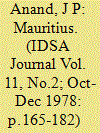

|
|
|
| 18 |
ID:
158324
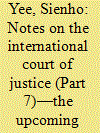

|
|
|
|
|
| Summary/Abstract |
The request for advisory opinion on the separation of the Chagos Archipelago puts in play (1) the cause of decolonization and the Court’s participation in the UN’s work in this regard and (2) the consent principle in international dispute settlement. Part II reviews in broad outline the law on this matter, which requires that the giving of an advisory opinion by the Court can only be done in a way compatible with its judicial character and with full respect for the consent principle. Part III argues that the giving of an opinion that would concern the main issues in a bilateral dispute without the requisite consent of the parties or that would have the effect of circumventing the consent principle would be incompatible with the Court’s judicial character and would constitute a compelling reason calling for the Court’s refusal to give the requested advisory opinion on such issues. Part IV elaborates that the fact that fully answering the questions put to the Court would necessitate addressing the main or essential issues, including the lawfulness of the detachment of the Chagos Archipelago from Mauritius and ultimately the validity of the detachment agreement, in the bilateral dispute between the Mauritius and the United Kingdom without the latter’s consent, and would be incompatible with the Court’s judicial character, is a compelling reason calling for the Court’s refusal to give the requested opinion on such issues. Part V maintains that in the light of decolonization being a Charter-mandated, important and traditional aspect of the UN’s work, if the Court feels compelled to give an advisory opinion, it may do so on what law may be applicable to, but not on how that law applies to, the main or essential issues involved in the bilateral dispute between the two States, especially the lawfulness of the detachment of the Chagos Archipelago from Mauritius and ultimately the validity of the detachment agreement. This approach may afford the best benefits to both sides. Part VI briefly concludes the paper.
|
|
|
|
|
|
|
|
|
|
|
|
|
|
|
|
| 19 |
ID:
119115
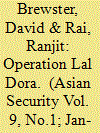

|
|
|
|
|
| Publication |
2013.
|
| Summary/Abstract |
As India expands its strategic reach in the Indian Ocean, it will need friends that it can count on. The island state of Mauritius has long been one of India's closest allies in the region. This article discusses India's plans for a military intervention in Mauritius in 1983 to prevent a feared coup that may have threatened India's interests. A naval task force was readied, but the intervention did not proceed because of disagreements in India's leadership. Instead New Delhi facilitated a political solution to the crisis that firmly consolidated its special role. This previously undisclosed episode sheds light on India's thinking about the Indian Ocean, the alignment of India's interests with the United States, and India's military capabilities.
|
|
|
|
|
|
|
|
|
|
|
|
|
|
|
|
| 20 |
ID:
109097
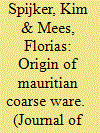

|
|
|
|
|
|
|
|